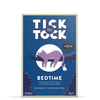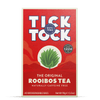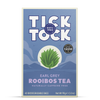
We encourage you to take a moment to read about the importance of sleep and the benefits of replacing caffeine with a delicious cup of Tick Tock. We asked independent sleep therapist Christabel Majendie (BSc, MSc, MBPsS) to put a little science behind it all and give some recommendations on how to make your nights as restful and comfortable as possible.
Here is what she had to say:
The importance of a good night’s sleep
As one famous sleep researcher put it, “If sleep does not serve an absolutely vital function, then it is the biggest mistake the evolutionary process has ever made.”
The functions of sleep are still under investigation, however it appears to play many vital roles. Sleep may involve rebuilding of key cellular components needed for wakefulness and removal of cellular waste components. The state of wakefulness may be unsustainable so sleep is needed for replenishment and restoration. Sleep may be particularly important for detoxification of the brain. Recently, researchers found that the channels in the brain that remove waste products collected during the day actually widen when we sleep. There may be a link here with Alzheimer’s disease and dementia.
Sleep also appears to play a vital role in memory consolidation and learning, both vital for survival. Other functions of sleep may be conservation of energy (beyond restful waking), the regulation of emotions, body temperature, the immune system and metabolism.
The effects of sleep deprivation
Even so, sleep is often not taken seriously, and viewed as an inconvenience we mask the signs of poor sleep with stimulants such as caffeine. But the importance of sleep becomes undeniable when we look at the effects of sleep deprivation. In the short term, lack of sleep impacts significantly on cognitive functions such as attention, alertness, concentration and problem solving. It also has a negative effect on memory and learning and can cause low mood and irritability the next day.While these short term effects are reversible, in the long term the consequences are more alarming. Regular lack of sleep is linked to physical conditions such as obesity, diabetes, high blood pressure and coronary heart disease and is associated with reduced life expectancy. In addition, chronic sleep deprivation increases your chances of having an accident and is also linked to mental health conditions such as depression and anxiety.


The benefits of reducing caffeine
Caffeine and sleep
Caffeine is so commonly consumed in our society that it is easy to forget it is a drug. Caffeine stimulates our nervous system, making us feel more alert and more awake. So it is no surprise that the desire for caffeine increases if we are tired and sleep deprived. The problem is that too much caffeine consumed during the day can affect sleep quality and quantity. This is because caffeine counteracts the effect of a natural ‘sleep factor’ called adenosine that builds up in the body throughout the day. This sleep factor plays a role in regulating how long we are awake. Caffeine before bedtime also reduces the amount of deep sleep we have, making us more likely to wake in the night.
Caffeine and health
Caffeine increases levels of Adrenaline in the bloodstream, a hormone that is released in the ‘fight or flight reaction,’ when we are stressed and need to get things done. A reliance on it may indicate that you are not getting enough sleep or good enough sleep. And if you are dependent on caffeine throughout the day to maintain alertness and concentration, it is likely that this will then impact on your subsequent sleep making the problem worse as a vicious cycle develops.
Heavy consumption of caffeine during the day may also lead to feeling over-stimulated in the evening and we may counteract this by unconsciously, self-medicating with sedatives such as alcohol or sleeping pills to wind us down and help us sleep. Clearly, this pattern of behaviour is not a healthy one.
Sources of Caffeine
Caffeine is not just found in coffee and tea. It is also found in energy drinks, coke and other fizzy drinks, chocolate products and even green tea. It is also found in several painkillers, diet pills and medications for colds.
Therefore, it is easy to see how your caffeine levels can add up throughout the day without you realizing. Some brands of decaffeinated coffee and tea have even been found to contain small amounts of caffeine.
The good news is that there are great alternatives to caffeinated drinks. Rooibos is a naturally caffeine-free tea which is rich in antioxidants. It is also high in many vitamins and minerals. So as well as being good for your sleep it can actually have a beneficial effect on the immune system, and on your general health.
Recommendations: sleep routines and sleeping environments
Having established sleep is vital for our health and wellbeing and caffeine may affect sleep quality and quantity, here are some suggestions to increase your chances of a good night’s sleep.
Avoid caffeine six hours before your bedtime. Replace caffeinated hot drinks with alternatives such as Rooibos to reduce caffeine levels and to benefit from other health benefits. The Tick Tock Rooibos range comes in many different flavours giving you plenty of choice and variation.
Be aware of other products containing caffeine and reduce these or avoid these if possible. Replace chocolate snacks with healthier alternatives. Milk or dairy products as a snack before bed may help as these contain a natural amino acid that promotes sleep. Or try a complex carbohydrate such as wholemeal toast or cereal. Vitamin B1 (found in nuts, beans, peas, wholegrain bread, fortified cereals) and magnesium (in nuts, wholegrain cereals, bananas, green leafy vegetables and milk) may also promote sleep.
Hunger causes wakefulness by releasing adrenaline so a light snack before bed can help sleep. Conversely, going to bed on a full stomach can keep you awake as your body is trying to digest all that food and this interferes with sleep.

Make your bedroom as calming and as comfortable as possible to help you wind down and relax. Make sure your bedding is also comfortable and made from natural material. Discomfort is a common cause of sleep problems so replace old or uncomfortable mattresses with new ones. Choose a mattress with a firmness that suits your personal preference. Look for brands made from natural materials, such as Naturalmat, as these will help to regulate your body temperature so you are less likely to wake up during the night feeling too cold or too hot.
Take your sleep seriously this year: kick the caffeine and treat yourself to a new mattress. We spend a third of our lives asleep so make it as comfortable and restful as possible!




